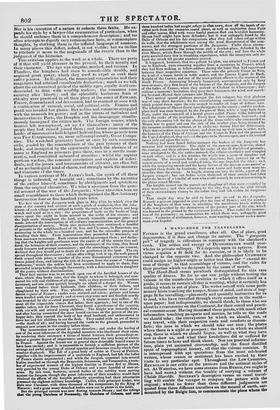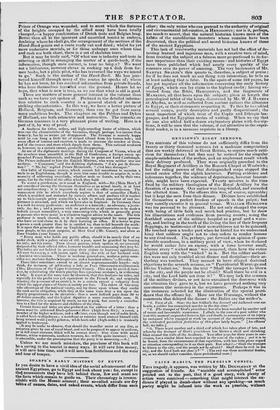A HAND - BOOK FOK TRAVELLERS.
FITNESS is the grand excellence, after all. Out of place, good degenerates, if it does not change its nature. The " gorgeous pall" of tragedy is ridiculous in company with the shepherd's crook. The action and energy of DEMOSTHENES would over- whelm in private colloquy. Wit depends upon its aptness. Even virtue requires a fit field for its exercise, or it is likely to be changed to the opposite vice. And the philosopher CUDWORTH could assign no higher origin or better test than the " eternal fit- ness of things" to that assemblage of virtues, and the rules for their practice which we designate by the name of morals. The Hand-Book seems peculiarly distinguished for this rare quality of fitness. So far as one can judge without testing the volume in the numberless localities to which it offers itself as a guide, it seems to contain all that is wanting, whilst it certainly has nothing which is out of place. The writer sets off with some preli- minary hints touching the temper, frame of mind, and state of bag- gage fit for travelling,—pleasantly and quaintly instructive for us to read, who have travelled through every country in the world— upon paper ; but indispensable, we should think, to those who are about to excursionize on the Continent, for their sound and practi- cal commonsense. Having dismissed these points, with much other information touching passports and monies, he tells us the roads we should take; the conveyances by which we should, can, or may travel, sith their respective costs and comforts or discom- forts; the inns in which we should take our ease ; the places where there is a sight or prospect; the towns in which we should stop, those in which we should linger, as well as what they have now to show us, and what their forefathers did or suffered for future times to hear and think about. Nor are practical informa- tion, plain yet animated ciceroneship, and the finest distilled spirit of topographical history, all that the volume contains. It is interspersed with apt quotations from the most celebrated writers, whose reason or sentiment has been excited by their visits to any particular spot. Throughout the Low Countries, REYNOLDS is our critic on the pictures and the national styles of art. At Waterloo, we have some stanzas from BON, (we ought to have had more,) without the trouble of carrying a volume of Chide Harolde. SOUTHEY'S descriptive verses on canal travel- ling will enable the voyager to compare the picture with the original; whilst no fewer than three different judgments are quoted from three different travellers on the mound of earth, sur- mounted by the Belgic lion, to commemorate the place where the Prince of Orange was wounded, and to erect which the features of the heights occupied by the allied army have been totally changed,—a happy combination of Dutch taste and Belgian brag. Better than all to the ignorant and unsettled tourist in embryo, doubting where be shall go, the arrangement of the sections of the Hand-Book points out a route ready cut and dried ; whilst for yet more undeeisive mortals, or fur those unhappy ones whose time and cash are both short, there is a set of skeleton tours.
But it may be truly said, "Of what use is industry and taste in selecting or skill in arranging the matter of a guide-book, if the information, though once correct, is true no longer? We want not a litterateur, however clever in cooking up a dish from for- mer books, but a plain pilot, who has traversed the ways we intend to go." Such is the author of the Hand-Book. He has jour- neyed himself through many of the routes he speaks of; where be has not been, he bas received information from private friends, who have themselves travelled over the ground. Hence let us hope, that what is new is true, as we see that what is old is good.
There are matters of more general interest in the volume than such as we have yet spoken of. Prefixed to the detailed informa- tion relative to each country is a general sketch of its most striking characteristics. In this way, we have a better picture of Holland, Belgium, and Germany, than can be got from many more ambitious books. The chapters on the Polders and Dykes of Holland, are both attractive and instructive. The remarks on German manners is a very pleasant piece of writing. Here is a part of it, by way of proof.
A fondness for titles, orders, and high-sounding forms of address, which was ever the characteristic of the Germans, though perhaps less intense than formerly, has by no means yet disappeared. The German is scarcely happy until he can hang a little bit of striped riband from his button-hole ; and every effort of interest and exertion is made to increase the number of them, and of the crosses and stars which dangle from them. This national weakness is, however, to a certain extent, gradually disappearing.
At one of the diplomatic meetings during the Congress of Vienna, when all the members were assembled in the Hall of Conference, a foreign envoy ap- proached Plince Metternich, and begged him to point out Lord Castlereagh. The Prince indicated to him the English Minister, who wore neither star nor uniform. " Comment," said the doubting diplomate, " ii n'a pas de decora- tion ? " " Ma foi," replied Prince Metternich, " c'est hien distingue."
One habit of German society, which cannot fail sometimes to occasion a smile to an Englishman, though it costs him some trouble to acquire it, is the necessity of addressing everybody, whether male or female, not by their own name, but by the titles of the office which they hold.
To accost a gentleman, as is usual in England, with—Sir (Mein Herr), if not considered among the Germans themselves as an actual insult, is at least not complimentary : it is requisite to find out his office or profession. The commonest title to which everybody aspires is that of councillor (Rath), which is modified and extended by variona affixes and prefixes till it reaches up to Geliciinrath privy councillor), a title to which somewhat of real im- portance is attached, and which we have also in England. In Germany there is a rath for every profession : an architect is a baurath ; an advocate, a justia- rath, &c. Ste. ; and a person with no profession at all contrives to be made a hofrath (court councillor), a very unmeaning title, which is generally given to persons who were never in a situation to.give advice to the court. The title professor is much abused, as it is certainly appropriated by many persons who have no real claim to it by their learning or office. It is better to give a person a rank greater than he is entitled to, than to fall beneath the mark. It is upon this principle that an Englishman is sometimes addressed by com- mon people, to his great surprise, as Herr Graf (Mr. Count), and often as Euer Gnaden (your Grace).
" Every man who holds any public office, should it be merely that of an under clerk, with a paltry salary of 40/. a year, must be gratified by hearing his title, not his name. Even absent persons, when spoken of, are generally designated by their official titles, however humble and unmeaning they may be. The ladies are not behind in asserting their claims to honoraly appellations. All over Gsrmariy, a wife insists upon taking the title of her husband with a feminine termination. There is madame general-ess, madame privy-coun- cillor-ess, madame dayboola-keeper-ess, and a hundred others."—RUSSEL.
Those titles sometimes extend to an almost unpronounceable length only think, for instance, of addressing a lady as Frau Oberconsisterialdirectorin (Mrs. Directress of the tipper Consistory Court). This may be avoided, how- ever, by substituting the words gniidige frau (gracious madame), in addressing a lady. It must at the same time be observed, that this fondness for titles, and especially for the prefix von (of, equivalent to the French de, and originally denoting the possessor of an estate), is to a certain extent a vulgarity from which the upper classes of German society are free. The rulers of Germany take advantage of the national vanity, and lay those upon whom they confer the rank under obligation, while they at the same time levy a tax upon the dignity proportionate to its elevation; thus a were hofrath pays from 30 to 40 dollars annually, and the higher dignities a more considerable suns. If, however, the title is acquired by merit, no tax is paid4 but merely a contribu- tion to a fund for the widows and children of the class.
Certain forms and titles are also prefixed on the address of a letter: thus a baron must he addiessed Hoch-geborener-Herr (high- born Sir); a count, a member of the higher noblesse, and a minister, even though not of noble birth, is called hoch-wohlgeboren ; a merchant or roturier must content himself with being termed wold-(well) geboren, while hochsedel (high-noble) is ironically applied to tradesmen.
Lit may be useful to observe, that should the traveller assist at any fete, or reception given by one of royal hlood, and not be prepared to appear in uniform, or in full court costume, black will be correct dress : blue coats with metal buttons, white waistcoats, nankeen trousers, &c. will be quite incorrect : black is admissible, under the presumption that the party is in mourning.—S.1
Unless we are much mistaken, the purchase of this book will be a.saving to the tourist in many ways. It will save him money, it will save him time, and it will save him fretfulness arid the wear and tear of temper.



























 Previous page
Previous page